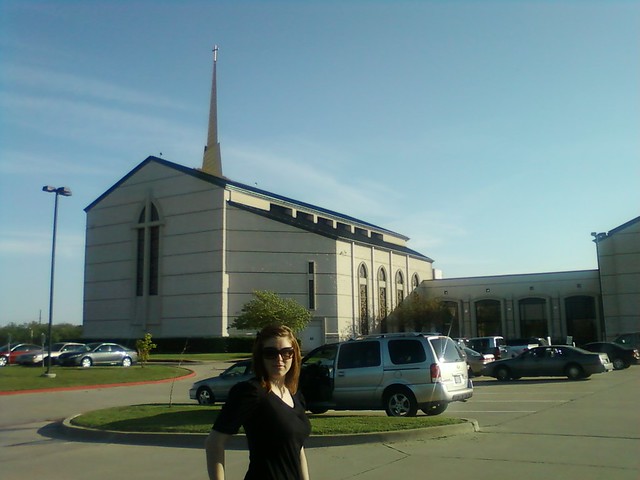
Terry and I left Lansing mid-morning on Thursday, April 5th, heading south via the Kansas Turnpike to spend the next four days with our 20-something kids in North Texas. Since I’m the early riser, I took Apollo to the kennel before the sun broke the horizon. Once back home, I finished packing the car, including a set of old metal (and heavy) car ramps and most of Rachelle’s 2-D art from her high school days (now a half-decade in the past). I took out the protective cover we place on the backseat to protect the leather from Apollo and wiped the seats down with leather cleaner and moisturizer.
Once Terry woke up and got dressed, we hit the road, entering the Turnpike at ten before ten o’clock. Since the speed limit rose to 75 mph, I prefer to pay the extra $10.75 to cross quickly across Kansas, instead of zig-zagging and slowing down for every little town on other routes (like US-69 or US-75). We reached the southern terminus of the Turnpike before one o’clock and stopped in Guthrie to top off the tank.

As we were passing through Oklahoma City, we followed a very low profile sports car (see photo at right) which we finally determined was a Ford, a GT 40. Very, very nice vehicle. Just wish I could have gotten a better photograph of it. Hard to accomplish while also driving.
 Before leaving work on Wednesday, I had popped down to the lobby and checked out a couple of audiobooks from the Plaza Branch of the Kansas City Public Library. The selection available for science fiction and fantasy amounted to less than a dozen titles, some of which were duplicates. I sighed. I selected a couple of Terry Brooks novels set in the Shannara world, knowing that Terry had read Brooks and liked him. I have read (not listened to) nearly all of Brooks’ Shannara novels, so I am very familiar with the setting. I inserted the first disc of Armageddon’s Children into the Bonneville’s seldom used CD player. The novel, which reveals the post-apocalyptic origins to the famous Sword of Shannara, made for grim, but gripping, listening and made the miles fly by as we continued south across Oklahoma.
Before leaving work on Wednesday, I had popped down to the lobby and checked out a couple of audiobooks from the Plaza Branch of the Kansas City Public Library. The selection available for science fiction and fantasy amounted to less than a dozen titles, some of which were duplicates. I sighed. I selected a couple of Terry Brooks novels set in the Shannara world, knowing that Terry had read Brooks and liked him. I have read (not listened to) nearly all of Brooks’ Shannara novels, so I am very familiar with the setting. I inserted the first disc of Armageddon’s Children into the Bonneville’s seldom used CD player. The novel, which reveals the post-apocalyptic origins to the famous Sword of Shannara, made for grim, but gripping, listening and made the miles fly by as we continued south across Oklahoma.

We crossed into Texas just shy of five o’clock and stopped at our favorite Texas tourist information spot for a brief biobreak. I sent Rachelle a text to let her know we were close (within forty miles). As we passed Sangar, traffic slowed to a crawl (usual for Denton at this time of day thanks to the splitting of I-35, which also narrows and becomes increasingly congested until you get past Lewisville). Worried that an accident was disrupting traffic, I called Rachelle and asked if I should take the first Denton exit. She and Nic conferred and confirmed we should exit at 380 and then asked for directions from that exit to their apartment. I found Hickory Street easily enough, but drove right by their apartment and had to turn around when I reached North North Texas (yes, that’s a street name plus a direction). Even with the traffic delays, we made it to their apartment in record time, arriving just past 5:30 p.m. We unpacked and then graced a local sandwich shop with our presence for a quick supper.
 We returned to Rachelle’s apartment and I setup our portable airbed, while Nic and Terry found something to stream via Netflix. I didn’t stay up too late, being exhausted from the long drive. I crashed while the rest of the gang watched the Mystery Science Theater 3000 movie, which lampooned the 1955 movie This Island Earth. I don’t think I missed much. Sometimes I’m glad I was born in the 60s.
We returned to Rachelle’s apartment and I setup our portable airbed, while Nic and Terry found something to stream via Netflix. I didn’t stay up too late, being exhausted from the long drive. I crashed while the rest of the gang watched the Mystery Science Theater 3000 movie, which lampooned the 1955 movie This Island Earth. I don’t think I missed much. Sometimes I’m glad I was born in the 60s.
I woke up early on Friday, thanks to my cell phone’s alarm. I quietly left Terry to his dreams and took my Nook with me to the living room, where I read for a bit while waiting for Rachelle to wake up. I wanted to spend the morning addressing her graduation announcements. Once she woke up, I retrieved my laptop and got connected to her wifi so I could look up addresses. She and I sat at the kitchen table for the next couple of hours. I didn’t quite have enough stamps for all the envelopes though. Once Terry woke up, we went to the grocery store to pick up a few items and to buy stamps. We mailed the announcements after leaving the store.
The rest of the day, Rachelle worked on her thesis paper. Terry napped or watched Netflix and I read. I also attempted a new bread recipe I received in a promotional e-mail from King Arthur Flour. The Italian Easter Cheese bread stuck fast in the pan, despite generous oiling of the pan. We eventually got the bread out of the pan and wrapped it up to keep it fresh for Easter Sunday dinner.
 Rachelle and I left for Good Friday worship in the early evening. We had a long drive to cross over from Denton to the east side of Plano. I opted to sit in the very back of the sanctuary, something I rarely do at worship, but because I decided to wear street clothes (jeans and walking shoes), I felt less conspicuous in the back. I listened as the orchestra ran through several of their musical offerings, including a beautiful and poignant arrangement of ‘Were You There?’ The Good Friday service included only two hymns sung by the congregation and many of the Lenten selections by the choir from the past few weeks of Lent. The worship service focused on the first nine stations of the cross, extinguishing a candle on the altar after each station, leaving all of the candles dark as the Good Friday service ended.
Rachelle and I left for Good Friday worship in the early evening. We had a long drive to cross over from Denton to the east side of Plano. I opted to sit in the very back of the sanctuary, something I rarely do at worship, but because I decided to wear street clothes (jeans and walking shoes), I felt less conspicuous in the back. I listened as the orchestra ran through several of their musical offerings, including a beautiful and poignant arrangement of ‘Were You There?’ The Good Friday service included only two hymns sung by the congregation and many of the Lenten selections by the choir from the past few weeks of Lent. The worship service focused on the first nine stations of the cross, extinguishing a candle on the altar after each station, leaving all of the candles dark as the Good Friday service ended.
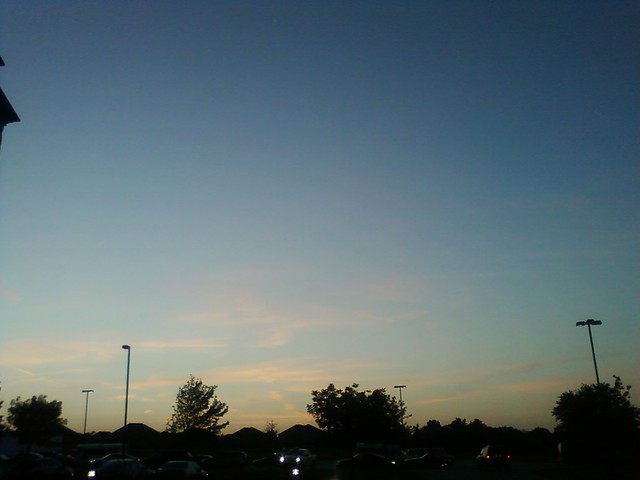
While waiting for Rachelle to derobe, I wandered the parking lot and snapped a photo of the quickly fading sunset (see photo to the left). Rachelle and I returned to Denton. For some reason I can’t recall what we did for dinner Friday night. I will have to ask Terry or call Rachelle and ask them to remind me. Once I know, I’ll update this paragraph with the appropriate culinary information.
Rachelle actually woke up before seven o’clock on Saturday and walked with me around her Denton neighborhood. The only photo I took while we were walking was of a yard filled with the Texas state flower, which I forgot to send to Flickr from my phone and subsequently deleted. Grrr.
Upon returning to the apartment, we whipped up a batch of real buttermilk pancakes. Then we took the car to a local farmer’s market so Rachelle could choose her weekly produce from a community-sponsored agriculture (CSA) she recently joined.
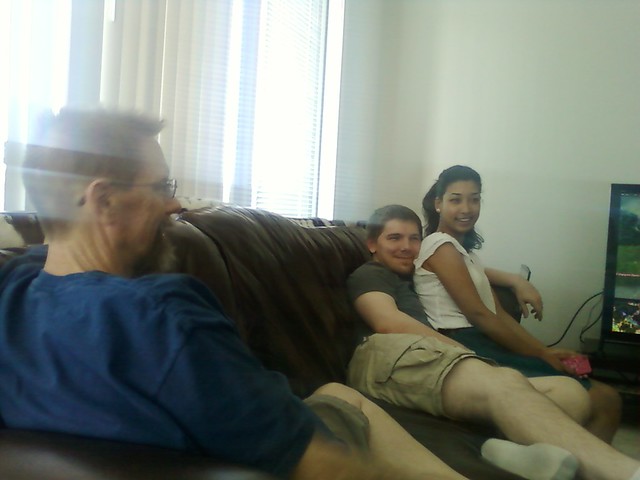 Once Terry woke up, we decided drive to Derek and Royna’s apartment for a visit. We learned during the visit that Derek’s truck had developed some alarming drive-train issues. Terry rode with Derek around the Colony and suggested that the truck be taken to a transmission shop for diagnosis. Nearly a week later, the shop still has the truck, but more on that in a separate post. We also decided that Easter dinner after worship would be simple fare of a Tex-Mex flavor. On the way back to Denton, we stopped and bought the fixings to make enchiladas and deviled eggs. After Nic got home from work, he and Rachelle worked like a well-oiled team to create the enchilada filling. Rachelle had less success with boiling eggs, rapidly going through nearly two dozen before Nic stepped in, with a new dozen he retrieved from a second trip to the grocery store.
Once Terry woke up, we decided drive to Derek and Royna’s apartment for a visit. We learned during the visit that Derek’s truck had developed some alarming drive-train issues. Terry rode with Derek around the Colony and suggested that the truck be taken to a transmission shop for diagnosis. Nearly a week later, the shop still has the truck, but more on that in a separate post. We also decided that Easter dinner after worship would be simple fare of a Tex-Mex flavor. On the way back to Denton, we stopped and bought the fixings to make enchiladas and deviled eggs. After Nic got home from work, he and Rachelle worked like a well-oiled team to create the enchilada filling. Rachelle had less success with boiling eggs, rapidly going through nearly two dozen before Nic stepped in, with a new dozen he retrieved from a second trip to the grocery store.
Since Rachelle had to sing in all three Easter worship services, we had to leave Denton at exactly seven o’clock Sunday morning to drop her off at the First UMC in Plano by 7:45 a.m. As soon as we dropped off Rachelle, we back-tracked to Derek and Royna’s apartment to relax until the last worship service scheduled for eleven o’clock. We stowed the enchilada ingredients in the fridge and settled down to visit with everyone.
I twisted Derek’s arm, insisting that everyone, including him, must attend Easter worship. He grunched and groaned but eventually got ready. As we were about to leave to return to church I realized I had a problem. Since Derek’s truck was undriveable, my vehicle, the Bonneville, was our only transportation to and from church. It only seats five adults. Not a problem getting to church, but returning with one more (Rachelle) meant we had six total adults. I suggested drawing straws, but of course Derek just grinned impishly. Nic actually volunteered but I reluctantly left Derek behind.
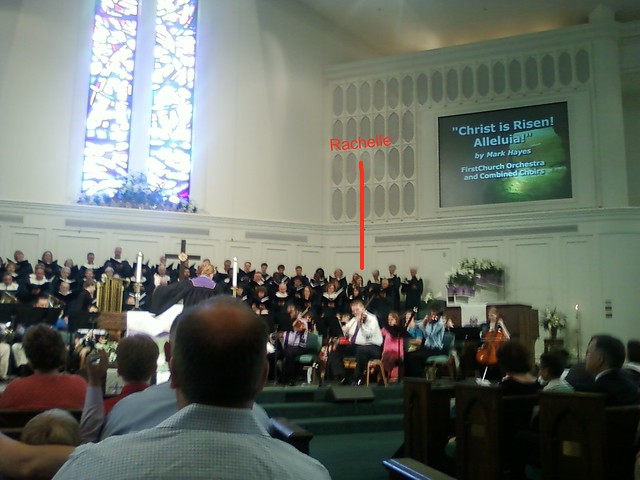
We returned to the church just before 10:30 a.m. and find a scarce parking spot. The second service had not ended so we took advantage of coffee and donuts while we waited. Once the sanctuary emptied, I led everyone to the middle section, about five rows back from the altar. By eleven o’clock, there wasn’t an empty seat to be found in the spacious (almost cavernous) sanctuary.
When Rachelle joined the Chancel Choir at First UMC Plano, I immediately went to their website to learn a bit about their ministry and their pastor. Imagine my surprise when I learned that their senior pastor, Gary Mueller, grew up in Kansas and graduated from KU. What are the odds? He even managed to insert KU basketball into his sermon, spending at least ten minutes reminiscing about past national championship games (including the most recent one less than a week old). At one point he even started chanting ‘Rock Chalk …’ and waited for the audience to respond with ‘Jayhawk’ … but a thousand plus Texans just fidgeted in their seats. I almost shouted ‘Jayhawk’ in support of a fellow Kansan, but couldn’t get over my Wildcat leanings. Eventually, he delivered an Easter message somehow managing to connect all the dots in the end.
Worship wrapped up with an ambitious and joyous rendition of Handel’s Hallelujah chorus, including an orchestra, the choir and audience participation from the congregation. By far, the loudest experience I’ve ever participated in at a church.
We gathered up Rachelle and returned to the Colony. Before everyone could change clothes, I insisted we gather in the hallway for some posed group family photos. I had neglected to do a similar session at Thanksgiving, and didn’t want to miss the opportunity again.
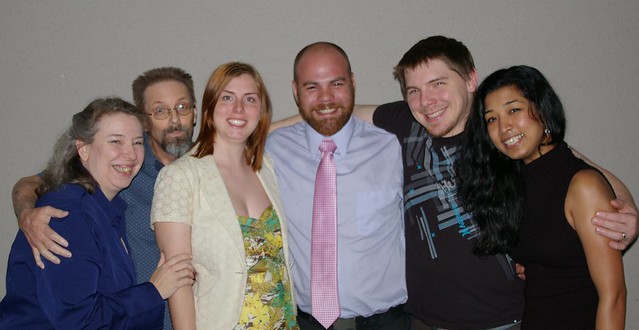
After the photo shoot, we returned to the apartment to relax and bake enchiladas. Rachelle set out the deviled eggs, which lasted about five minutes. We ate lunch and visited for a few minutes while our stomachs digested the delicious repast.

As a thunderstorm rolled through the area, Rachelle grabbed the bag of plastic Easter eggs we’d bought and stuffed with goodies. Since the rain prevented us from hiding eggs in a more traditional setting, the kids split the eggs up between the guys and the gals. Rachelle and Royna languished in the bedroom while Nic and Derek started hiding thirty-five eggs around the rest of the apartment. The eggs could go anywhere except in something (like the trash or the tank of a toilet). Once the eggs were hidden, the gals were released to search for them. Rachelle found a few more than Royna, but not many. Next, the guys were sent to the bedroom while Rachelle and Royna hid the rest of the eggs. Once the guys were released to hunt, it quickly became clear who was driven to win the egg hunting championship. Derek took the lead and never let up.
After the egg hunt, we sat around the table, watching the kids tally up their candy and coins. Eventually, several of us took naps. By five o’clock, we decided it was time to return to Denton. We hugged and said goodbye to Derek and Royna. While we will see Derek again in mid-May when Rachelle graduates from UNT, Royna is returning to Nepal to visit her parents until early July.
Monday morning Terry and I woke up early, packing the Bonneville by seven o’clock and saying goodbye to Rachelle. We headed north on I-35 at 7:30 a.m. We made very few stops, opting to get breakfast via drive-through in Ardmore, Oklahoma and catching a quick ten minute lunch at a McDonalds on the Kansas Turnpike. We pulled into our driveway at 4:30 p.m. Monday afternoon. The first thing I noticed was how tall the grass in the side yard had grown.
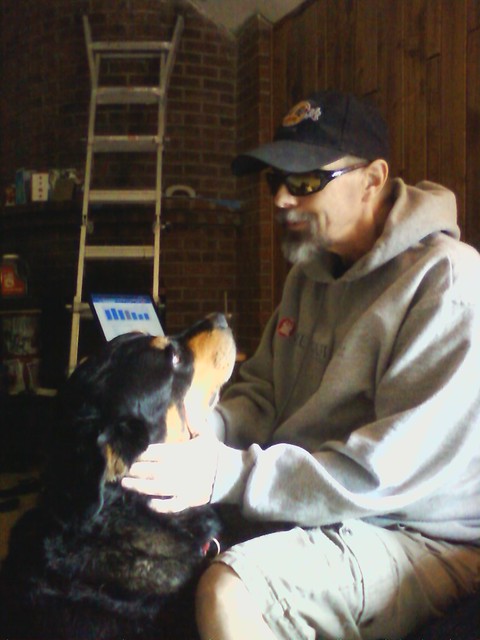 We unpacked the Bonneville and I pulled out the mower. I spent thirty or forty minutes taming the yard and then relaxed until shortly after five, when Terry and I left the house to retrieve Apollo from the kennel. We had to wait a few minutes while they finished blow drying him after his bath and trimming his nails. He was still a bit damp, but still very excited to see us. I noticed immediately he’d put on weight. Having other dogs near him must have spurred on his competitive juices and inspired him to actually eat his food. Terry and I returned home and ordered a carryout dinner from our local Pizza Hut. Neither of us felt like making yet another trip to the grocery store. Pasta, wings and cinnamon sticks hit the spot perfectly.
We unpacked the Bonneville and I pulled out the mower. I spent thirty or forty minutes taming the yard and then relaxed until shortly after five, when Terry and I left the house to retrieve Apollo from the kennel. We had to wait a few minutes while they finished blow drying him after his bath and trimming his nails. He was still a bit damp, but still very excited to see us. I noticed immediately he’d put on weight. Having other dogs near him must have spurred on his competitive juices and inspired him to actually eat his food. Terry and I returned home and ordered a carryout dinner from our local Pizza Hut. Neither of us felt like making yet another trip to the grocery store. Pasta, wings and cinnamon sticks hit the spot perfectly.
Terry and I had a great time with our kids over Easter weekend. Lucky for us, we get to repeat this entire process in just three weeks, when we return to Denton to attend Rachelle’s graduation from the University of North Texas.
Happy Easter!

 I ventured to a church just down the hill from me (
I ventured to a church just down the hill from me (










